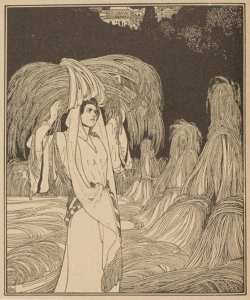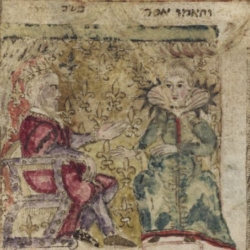“Elimelekh G’la” is a Byzantine-era Western Aramaic poetic retelling of the Book of Ruth. It was probably originally used as part of the liturgy for Shavuot, perhaps as a poetic addition to the recitation of a Targumic interpretation of the Book of Ruth. (The verses from Ruth and Psalms appended to the coda of the piyyuṭ would suggest such a Sitz im Leben.) But in any case, it has a great acrostic structure and rhyme scheme, and ought to be preserved! Here is included a vocalized text, largely based on the unvocalized text compiled in Jewish Palestinian Aramaic Poetry from Late Antiquity (ed. Yahalom and Sakaloff, 1999) where it’s the tenth poem recorded. ‘ve added a rhyming poetic translation that preserves the Hebrew acrostic. Credit to Laura Suzanne Lieber’s literal translations of these poems (in Jewish Aramaic Poetry from Late Antiquity: Translations and Commentaries, 2018), which have served as a very helpful resource for the project.
| Source (Aramaic) | Translation (English) |
|---|---|
אֵלִימֶֽלֶךְ גְּלָה וּפְנָה מִן־קֳדָם כַּפְנָה וְעִמֵּיהּ חִסְדָא וְחַנָּה וּתְרֵין גוֹזְלוֹי בְּקָנָה |
As Elimelekh turned and fled the famine looming over his head, The gracious one came, she who shared his bed, with the two nestling chicks the two of them led. |
בְּגִין דְּלָא יִתְמַסְכֵּן גְּלָה וַעֲבַד־כֵּן וְרָאשֵׁיהּ בְּמוֹאָב אַרְכֵן בְּרִיךְ הוּא דַעֲבַד כֵּן |
Barely escaping poverty’s touch, he fled to exile and did as such: In Moab he lived, a final sleep did him clutch. Blessed be the one who did as such! |
גּוֹזְלוֹי נָשִׁין נְסִבוּן וְתַמָּן יִתְבוּן וּלְקֵץ יוֹמִין שְׁכִבוּן וְלָא אִתְעַכַּבוּן |
Getting married, his fledglings each took a maid, and at that spot the two of them stayed Days passed, on their deathbed each one laid, and no longer labored in life as their trade. |
דִּמְעַת נָעֳמִי בְּעֵינֵהָ בְּזַעַת מָאנֵיהָ עַל בַּעְלָהּ וְעַל בָּנֵיהָ דְּאִשְׁתְּנוּן עִדַּנֵיהָ |
Dripped tears from Naˁomi’s eyes, and she tore her garments at their demise, Over her husband and sons, those guys against whom time’s changes had to arise. |
הַא מִן מוֹאַב נְפַקַת וּלְבֵית לֶחֶם אַסְקַת עׇרְפָּה מִנָּהּ רְחַקַת וְרוּת בַּהּ דַבְקַת |
Hey, from Moab she went out, ascending to Bethlehem at the end of the drought. Orpah left her behind, turning about, but Ruth stuck to her as they went on their route. |
וַאֲמַרַת רוּת לְנָעֳמִי עַמָּךְ הוּא עַמִּי לַחְמָךְ הוּא לַחְמִי עַד דְּנֵיזִיל לְבֵית עָלְמִי |
While they went, to Naˁomi Ruth spoke: “Your people my people, your folk is my folk. Your bread is my bread, your laws are my yoke, until I go on to the next life and croak!” |
זְמַנָהּ דַּאֲתוּן לְבֵית לֶחֶם יְהוּדָה הֲוָה שֵׁירוּי חֲצָדַהּ נָעֳמִי בְּפוּמָהּ מַסְפְּדָה וְרוּת עֲטִיפָה חִסְדָה |
Zooming on till to Bethlehem in Judah they came, the time of the harvest, the very same. Naomi’s mouth was full of weeping and shame, but Ruth, wrapped in kindness, befitting her name. |
חַמִין נָשִׁין יָתָהּ וּרְהַטִין לְקַדְמוּתָהּ אֲתַת נָעֳמִי לְבֵיתָהּ וְעִמָהּ כַּלְתָהּ |
Here the women saw her and they ran towards her To Naˁomi’s house came her, and her daughter-in-law with her. |
טִלְיָיתָא לָא תִּקְרוּן לִי נָעֳמִי מְרִירָה הוּא שְׁמִי דְּאִתְחַלָל כַּרְמִי לְבַר מִתְחוּמִי |
“Try not to call me ‘Naˁomi,’ not sweet. My name should be ‘bitter,’ unpleasant to eat! For my vineyard defiled, decayed in the heat outside of my borders, my land incomplete. |
יְתִיבָה הֲוָות בְּשַׁלְוָוה רְחִימָה וַחֲבִיבָה וּכְדוֹן אֲנָּה יְתִיבָה צַדְיָיה וַעֲלִיבָה |
I dwelled once at ease, dearly lˁOved to these. But now, on my knees, bereft, none can appease.” |
כַּלְתָהּ נְפַקַת וּלְקַטַת וְשִׁבֳּלִים לְקַטַת יָמִין וּסְמָאל לָא נְטַת דְּתֶהוֺן חְבַטַת |
Kept at it, her daughter-in-law went out to glean, and picked through the stalks, golden and green. Not right nor not left did she turn or lean, threshing the grain — she made quite a scene! |
לַהּ חַמָּהּ בּוֹעַז קַיְּמָה כְּיָוָן תְּמִימָה וּשְׁאַל לְעוּלֵימָה מַן־הִיא דָּא דְּקַיְמָה |
Looking out, Boˁaz saw her standing there like a dove in her purity, he couldn’t help but stare. He asked his servant, “Are you aware who that girl standing there is, and from where?” |
מוֹאַבִיָּה הִיא דָא אֲמַר לֵיהּ חֲצוֹדָה דַּאֲתַת מִתְוַעֲדָה עִם אֻמָּה יְחִידָה |
“Moabite, that one, a Moabitess,” said the one oververseeing the harvest’s progress. “She cast her lot, in her faithfulness with the nation unique in the faith we confess.” |
נְטַה בּוֹעָז לְמַהֲלְכָה וְקַם יָתָהּ מְבַרְכָהּ תֶּהְוִוין בְּרִיכָה וּמִינָּךְ יְקוּם שְׂלֹמֹה מַלְכָּא |
Now Boˁaz got ready to go on his way, and rose up to her to bless her that day. “You will be blessed — for this I pray — and from you will arise King Solomon, I say.” |
סַגַדַת קֳדָמוֹי לְאַרְעָא וְתַנֵית לַחֲמַתָּהּ בְּדֵיעָה חֲמַתָּהּ לַהּ מוֹדָעָא דְּהוּא תּבוּעָה |
So she bowed before him, down to the earth, and told her in-law the news for what it was worth. Her in-law informed her, her voice full of mirth, that he had been their redeemer in birth! |
עֲטוּפִי לְבוּשִׁי הַדְרָה וּפוּקִי גַּבֵּיהּ לְאִדְּרָא טוּסִי עֲלוֹי כְּצִפָּרָה וּדְמוּכִי גַּבֵּיהּ עַד־צַפְרָה |
“Of course, wrap yourself up, fine clothes you must wear, and go to his place on the threshing-floor there. Fly like a bird on your way to his lair, and lie at his side till the morning glare!” |
פַרַת וּנְפַקַת וּבְצָדִּיקָה דְבַקַת וּבְמַשְׁכּוֹכִיתֵיהּ חֲבַקַת וּמִנַּהּ לָא רְחַקַת |
Promptly she rushed out to do that thing, and to the righteous man she did cling, Where he slept she embraced him, as if tied with string, not leaving his side for anything. |
צָדִּיקָה מָאנוֹי לְבַשׁ וְיִצְרֵהּ בִּישָׁה מִנֵיהּ כְּבַשׁ וְיָתָהּ עַד־צַפְרָה חֲבַשׁ וְאִתְעַסַּק בְּאוֹרַיתָא דְּחַלְיָא מִן־דְבַשׁ |
Choosing to remain clothed, the good man crushed his foul impulses as one can. Until dawn he restrained it, following his plan: studying honey-sweet Torah lying on his divan. |
קְרָא בּוֹעַז בְּצַפְרָה לְגוּבְרִין עֲסָרָה וְּאִיתֵיב יָתְהוֹן חֲבוּרָה וּקְדַשׁ יָתָהּ כַּהֲלָכָה וּכְתוֹרָה |
Quite early that morning Boˁaz called up ten men to serve as backup, and convened an assembly so as to set up a marriage by Torah, by law as writ up. |
רַבְרְבָנֵי חׇכְמְתָא בְּרֵכוּן לְרַבֵּיתָה תִּתְבַּרְכִין כַּלָה בְּרִיכְתָּה וּמִינָךְ תַקוּם מַלְכוּתָא |
Rich in wisdom, abounding in wit, they blessed the maiden as would befit: Be blessed, o blessed bride! As you commit, from you will an enduring kingdom emit! |
שֵׁירוּי עַבַדַת וְעִם צַדִּיקָיָּה חֲדַת וְזָמְרִין בִּדַּת וְעַבְּרַת וִילֵדַת |
She made a banquet meal, and rejoiced with the righteous in zeal, and made up songs for a speil, and conceived and gave birth for real. |
תַּקִּיפָה יְהַב לַהּ בַּר וּקְרַת שְׁמֵיהּ עוֹבֵד וְעֹבֵד֙ הוֹלִ֣יד אֶת־יִשָׁ֔י וְיִשַׁ֖י הוֹלִ֥יד אֶת־דָּוִֽד׃ |
The Mighty One gave her a son and she called him ˁOved. And ˁOved begat Yishai, and Yishai begat David. |
כַּכָּתוּב — וְאֵ֙לֶּה֙ תּוֹלְד֣וֹת פָּ֔רֶץ פֶּ֖רֶץ הוֹלִ֥יד אֶת־חֶצְרֽוֹן׃ וְחֶצְרוֹן֙ הוֹלִ֣יד אֶת־רָ֔ם וְרָ֖ם הוֹלִ֥יד אֶת־עַמִּֽינָדָֽב׃ וְעַמִּֽינָדָב֙ הוֹלִ֣יד אֶת־נַחְשׁ֔וֹן וְנַחְשׁ֖וֹן הוֹלִ֥יד אֶת־שַׂלְמָֽה׃ וְשַׂלְמוֹן֙ הוֹלִ֣יד אֶת־בֹּ֔עַז וּבֹ֖עַז הוֹלִ֥יד אֶת־עוֹבֵֽד׃ וְעֹבֵד֙ הוֹלִ֣יד אֶת־יִשָׁ֔י וְיִשַׁ֖י הוֹלִ֥יד אֶת־דָּוִֽד׃ (רות ד:יח-כב) הוֹד֣וּ לַיהֹוָ֣ה כִּי־ט֑וֹב כִּ֖י לְעוֹלָ֣ם חַסְדּֽוֹ׃ (תהלים קלו:א) |
As it is written: And these are the generations of Pæreṣ: Pereṣ begat Ḥeṣron. And Ḥeṣron begat Ram, and Ram begat ˁAmminadav. And ˁAmminadav begat Naḥshon, and Naḥshon begat Salmah. And Salmon begat Boˁaz, and Boˁaz begat ˁOved. And ˁOved begat Yishai, and Yishai begat David. (Ruth 4:18-22) Thank the CAUSE, who is good, who is eternally kind! (Psalms 136:1) |

“אֵלִימֶֽלֶךְ גְּלָה | Elimelekh G’la — a Byzantine-Era Piyyuṭ Retelling the Book of Ruth” is shared through the Open Siddur Project with a Creative Commons Attribution-ShareAlike 4.0 International copyleft license.










Leave a Reply